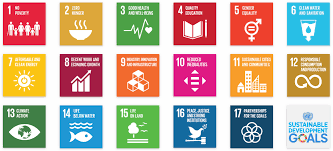The 17 Sustainable Development Goals of the United Nations
The United Nations has identified 17 Sustainable Development Goals (SDGs) to address global challenges and work towards a more sustainable future for all. These goals, adopted by all UN Member States in 2015 as part of the 2030 Agenda for Sustainable Development, aim to end poverty, protect the planet, and ensure prosperity for all.
No Poverty
Eradicating poverty in all its forms is the first goal of the SDGs. This includes ensuring social protection systems for those in need and promoting equal rights to economic resources.
Zero Hunger
Ending hunger, achieving food security, improving nutrition, and promoting sustainable agriculture are key components of this goal.
Good Health and Well-being
This goal focuses on ensuring healthy lives and promoting well-being for people of all ages.
The Genesis of the Sustainable Development Goals: Purpose and Rationale
Tackling Global Challenges Through the Sustainable Development Goals
4. The 2030 Agenda for Sustainable
- What are the 17 Sustainable Development Goals of the United Nations?
- Why were the Sustainable Development Goals created?
- How do the Sustainable Development Goals address global challenges?
- What is the significance of the 2030 Agenda for Sustainable Development?
- How can individuals contribute to achieving the Sustainable Development Goals?
What are the 17 Sustainable Development Goals of the United Nations?
The 17 Sustainable Development Goals (SDGs) of the United Nations encompass a comprehensive framework aimed at addressing global challenges and fostering sustainable development worldwide. These goals range from eradicating poverty and hunger to promoting quality education, gender equality, clean water and sanitation, affordable and clean energy, sustainable cities and communities, climate action, life below water, and life on land. Each goal represents a critical aspect of building a more equitable, resilient, and prosperous future for all while safeguarding the planet’s resources for generations to come.
Why were the Sustainable Development Goals created?
The Sustainable Development Goals (SDGs) were created by the United Nations to address the pressing global challenges facing humanity and the planet. These goals serve as a universal call to action to end poverty, protect the environment, and ensure prosperity for all by 2030. By setting specific targets and indicators, the SDGs aim to mobilise governments, businesses, and civil society to work together towards a more sustainable and equitable future. The creation of these goals reflects a shared commitment to tackle issues such as poverty, inequality, climate change, and environmental degradation on a global scale.
How do the Sustainable Development Goals address global challenges?
The Sustainable Development Goals (SDGs) of the United Nations provide a comprehensive framework to address a wide range of global challenges. By setting specific targets and indicators across 17 interconnected goals, the SDGs aim to tackle issues such as poverty, inequality, climate change, and environmental degradation in a holistic manner. These goals promote collaboration among countries, organisations, and individuals to work towards common objectives that benefit both people and the planet. Through their emphasis on sustainability, inclusivity, and partnership, the SDGs offer a roadmap for creating a more equitable and prosperous world for present and future generations.
What is the significance of the 2030 Agenda for Sustainable Development?
The 2030 Agenda for Sustainable Development holds immense significance as a global framework designed to guide countries towards a more sustainable and inclusive future. Adopted by all United Nations Member States in 2015, this agenda outlines 17 Sustainable Development Goals (SDGs) that address pressing global challenges such as poverty, inequality, climate change, and environmental degradation. By setting ambitious targets to be achieved by the year 2030, the agenda serves as a roadmap for governments, businesses, civil society, and individuals to work together towards creating a more prosperous and equitable world for present and future generations. The 2030 Agenda underscores the interconnectedness of social, economic, and environmental issues and emphasises the need for collaborative action on a global scale to achieve sustainable development for all.
How can individuals contribute to achieving the Sustainable Development Goals?
Individuals play a crucial role in contributing to the achievement of the 17 Sustainable Development Goals set by the United Nations. There are various ways in which individuals can make a difference, such as adopting sustainable lifestyle choices, raising awareness about the SDGs within their communities, supporting ethical businesses and initiatives, volunteering for causes aligned with the goals, and advocating for policy changes that promote sustainability and equality. By taking small yet meaningful actions in their daily lives and actively engaging with issues related to the SDGs, individuals can collectively drive positive change towards a more sustainable and equitable world for present and future generations.
